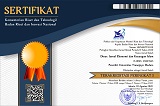Development of The Halal Industry in Indonesia: The Role of Sharia Rural Bank
Abstract
This study scrutinizes the role of Sharia Rural Banks in encouraging the development of the halal industry in Indonesia through the influence of credit disbursement and third-party funds collected by Sharia Rural Banks (BPRS). The halal industry has significant potential and requires financing based on sharia principles to create a synergy between the halal industry and sharia finance. BPRS sees a high priority in assisting the development of the halal industry because it is intended for the general public and small entrepreneurs who are not accessible to commercial banks. The research methodology employed in this study is quantitative, using multi-linear regression analysis (Ordinary Least Square) to determine the relationship between the credit disbursement of BPRS as well as third-party funds and the development of the halal industry in Indonesia. The results of the study indicate that the credit disbursement and the third-party funds collected by the BPRS have a significant role in the growth of the halal industry in Indonesia. This study advised more adaptive training in the future.
Keywords
Full Text:
PDFReferences
Asiyah, B. N. (2020). Analysis Of Islamic Bank Financing During The Pandemic Period On The Development Of Halal Umkm In Indonesia With Deposits As A Moderating. International Annual Conference on Islamic Economic and Law, 56–62.
Boukhatem, J. (2016). Assessing the direct effect of financial development on poverty reduction in a panel of low- and middle-income countries. Research in International Business and Finance, 37, 214–230. https://doi.org/10.1016/j.ribaf.2015.11.008
Center, I. H. L. (2022). Laporan Pasar Halal Indonesia 2021/2022.
Faisol, F. (2017). Islamic Bank Financing and It’s Impact on Small Medium Enterprise’s Performance. Etikonomi, 16(1), 13–24. https://doi.org/10.15408/etk.v16i1.4404
McKinnon, R. I. (1973). Money and Capital in Economic Development. The Brookings Institution.
Muner, S., Ali, A., & Ahmad, R. A. (2017). Impact of Financing on Small and Medium Enterprises (SMEs) Profitability with Moderating Role of Islamic Finance. Information Management and Business Review, 93(I), 259.
Novita, L. (2018). Pengaruh Pembiayaan Murabahah Terhadap Perkembangan UMKM Di Kecamatan Leuwiliang (Studi Kasus BPRS Amanah). Al-Infaq: Jurnal Ekonomi Islam, 5(2), 273–310. https://www.bps.go.id
Nurhidayat, R. (2011). Analisis Permasalahan Pembiayaan UMKM di Indonesia. Kajian Ekonomi Dan Keuangan, 15(2), 53–68.
Nuriyah, A., Endri, E., & Yasid, M. (2018). Micro, Small-Financial Financing and Its Implications on the Profitability of Sharia Banks. DeReMa (Development Research of Management): Jurnal Manajemen, 13(2), 175.
Roberto, A., & Suwandi, S. (2017). Keuangan Mikro Untuk Penanggulangan Kemiskinan (P. Purwitorosari (ed.)). Sekolah Pascasarjana Universitas Gajah Mada. http://repository.upstegal.ac.id/3052/
Sukoso, Wiryawan, A., Kusnadi, J., & Sucipto. (2020). Ekosistem Industri Halal. In Departemen Ekonomi dan Keuangan Syariah-Bank Indonesia Pusat Studi Halal Thoyyib-Universitas Brawijaya. Departemen Ekonomi dan Keuangan Syariah Bank Indonesia.
Zhuang, J., Gunatilake, H., Niimi, Y., Khan, M. E., Jiang, Y., Hasan, R., Khor, N., Lagman-Martin, A. S., Bracey, P., & Huang, B. (2009). Financial Sector Development, Economic Growth, and Poverty Reduction: A Literature Review. ADB Economics Working Paper Series, 173(173), 1–48. https://doi.org/10.2139/ssrn.1617022
DOI: https://doi.org/10.21107/dinar.v9i2.13989
Refbacks
- There are currently no refbacks.
Copyright (c) 2023 Riskiyatul Khasanah, Nur Azizah

This work is licensed under a Creative Commons Attribution-ShareAlike 4.0 International License.
Journal Dinar Indexed by:
Dinar: Jurnal Ekonomi dan Keuangan Islam by Universitas Trunojoyo Madura is licensed under a Creative Commons Attribution-ShareAlike 4.0 International License.






.png)










